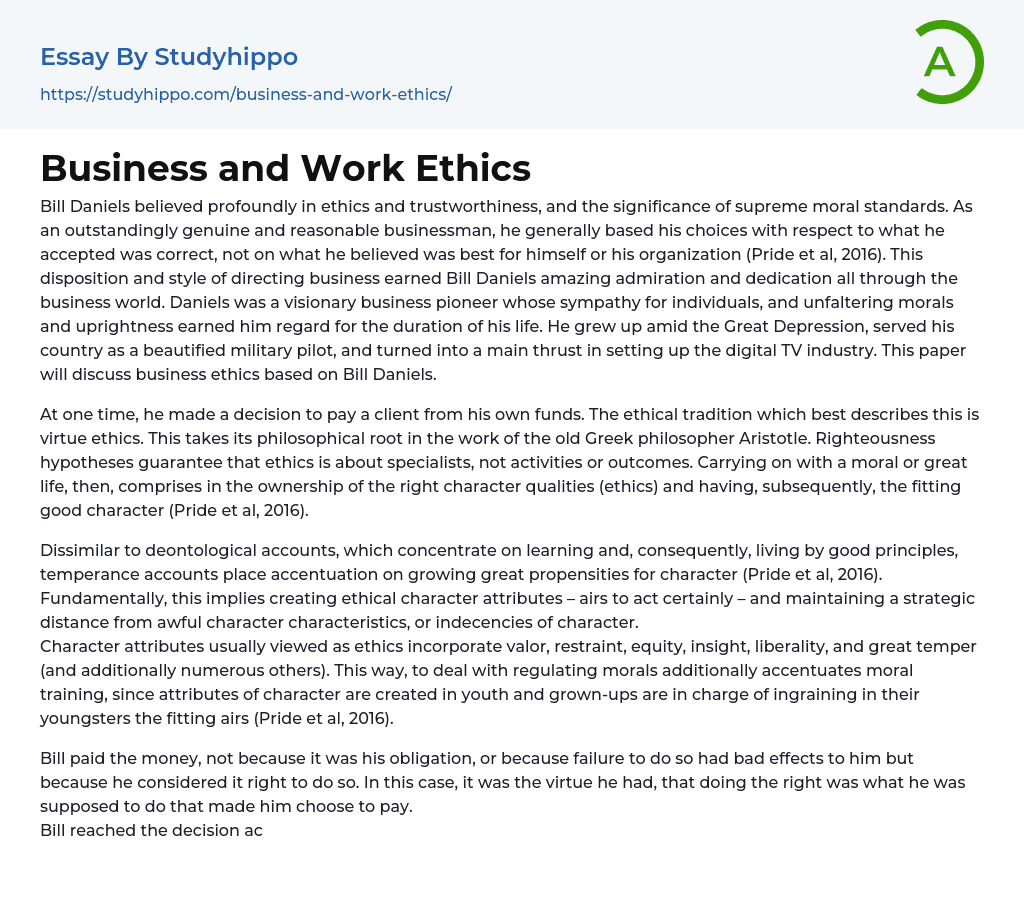Bill Daniels was known for his strong emphasis on ethics and trustworthiness, as well as his high moral standards. Being an honest and fair businessman, he always prioritized what he believed to be right, rather than personal or company gain (Pride et al, 2016). This ethical approach gained him immense respect and loyalty from the business community. Beyond that, Daniels was a visionary leader who genuinely cared about people and had unwavering integrity. He faced hardships during the Great Depression in his youth, served as a decorated military pilot, and played a vital role in establishing the cable television industry.
This paper will examine business ethics in relation to Bill Daniels, who once decided to use his personal funds to pay a client. The underlying ethical approach that aligns with this decision is virtue ethics, which can be traced back to the philosophy of the ancient Greek philosopher Aristotle.
...
The righteousness hypotheses propose that ethics is focused on individuals rather than actions or outcomes. Therefore, leading an ethical life entails possessing the right character qualities (ethics) and subsequently having the appropriate moral character (Pride et al, 2016). In contrast to deontological accounts which prioritize knowledge and abiding by moral principles, virtue accounts emphasize the development of good character habits (Pride et al, 2016). Essentially, this means cultivating ethical character attributes - attitudes that lead to confident action - and avoiding negative character traits or vices. Some commonly recognized ethical character attributes include bravery, self-control, fairness, wisdom, generosity, and good temper (among others). Consequently, this approach to regulating ethics also highlights the importance of moral education since character attributes are formed during childhood, and adults are responsibl
for instilling appropriate attitudes in their children (Pride et al, 2016).
Bill chose to pay the money not because of any obligation or negative consequences, but because he believed it was the right thing to do. His virtue of doing what is right guided his decision, as he followed the principles of virtue theory. There were no rules compelling him to pay, as he was not required to use his own funds. However, his virtues led him to believe that paying was the best and most appropriate course of action (Pride et al, 2016).
Bill attributed progress to higher stages of moral development to sports coaches. There are other factors that can lead someone to develop higher levels of moral reasoning, such as punishment (Pride et al, 2016). The individual's actions are determined by weighing the immediate physical consequences rather than the ethical evaluation of an action. By conforming to control, the main objective of the person is to avoid physical punishment. Therefore, decision making at stage one is characterized by compliance rather than moral judgments or remorse.
The acceptance of moral actions can be a strong motivator. When someone feels appreciated for their actions, they will be motivated to continue doing those appreciated actions. Over time, these actions will become ingrained in their character. According to Ferrell ; Fraedrich (2016), the principle-based approach to ethics involves following guidelines for behavior. These guidelines include both general principles and specific rules, such as duties, commitments, rights, or obligations.
Specific principles can be derived from general ones. An example of this is a principle against evil, which includes obligations to refrain from killing, attacking, or ambushing innocent individuals. Consequently, an individual
who adheres to rule-based ethics typically follows a set of moral guidelines that are reflected in their behavior. Within a professional context, we can observe this in the actions of a secondary teacher.
According to Ferrell ; Fraedrich (2016), teachers play a crucial role as facilitators of access and fairness in the educational system. They are guided by the principles of standard-based ethics and strive to provide equal opportunities for all students. Moral reasoning becomes significant when teachers are faced with inequalities, particularly when some students do not have access to necessary resources such as books and supplies. Within the framework of principle-based ethics, teachers feel a sense of obligation to assist these students, as it aligns with the right or just course of action, even if there may be negative consequences. However, it is important to acknowledge that the principle approach may not always account for situational differences.
Likewise, those who rely solely on principle-based ethics may show both tenacity and determination, both of which do not contribute to significant benefits.
References
- Ferrell, O. C., ; Fraedrich, J. (2016). Business ethics: Ethical decision making ; cases. Nelson Education.
- Pride, William, and Odies C. Ferrell. Foundations of marketing.
Cengage Learning, 2016.
- Board Of Directors essays
- Brand Management essays
- Business Ethics essays
- Business Management essays
- Change Management essays
- Comparative Analysis essays
- Decision Making essays
- Dispute Resolution essays
- Knowledge Management essays
- Leadership essays
- Leadership and Management essays
- Manager essays
- Operations Management essays
- Performance Management essays
- Product Management essays
- Project Management essays
- Quality Management essays
- Risk essays
- Risk Management essays
- Scientific Management essays
- Stress Management essays
- supply chain management essays
- Time Management essays
- Total Quality Management essays
- Belief essays
- Deontology essays
- Ethical dilemma essays
- Moral essays
- Normative Ethics essays
- Values of Life essays
- Virtue essays
- Virtue Ethics essays
- Work Ethic essays




